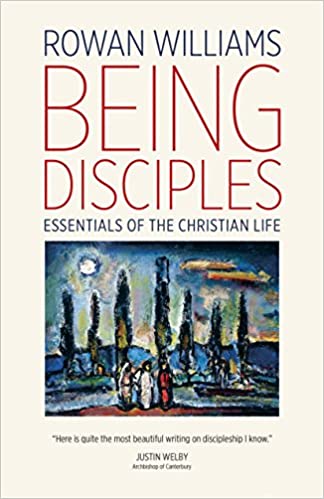This Tuesday we will be discussing chapter 2 – “Faith, Hope, and Love” – of Archbishop Rowan Williams’ book Being Disciples: Essentials of the Christian Life. The journey of a disciple begins with the three great theological virtues of Faith, Hope, and Love. It is these virtues which are given to us by the grace of God, define our ideal relationship to God, and ultimately allow us to be joined to God. As you prepare for this week’s discussion, please read the chapter slowly and contemplatively. As the chapter makes clear, we do not read or study for information, rather we do so to grow closer to God.
In his discussion of Faith, Hope, and Love as the first step of being on the path of discipleship, Dr. Williams uses the insights of St. John of the Cross’s work Dark Night of the Soul. St. John (1542-1591) was a Roman Catholic Spanish monk. The work is based on a poem of the same name that narrates the soul’s journey from this world to that mystical union with the Absolute Divine Ineffable Transcendent. St. John introduces the purpose of his work as “the soul telling the mode and manner in which it departs, as to its affection, from itself and from all things, dying through a true mortification to all of them and to itself, to arrive at a sweet and delicious life with God.” For St. John, deification is only achieved by the purgation of the soul of the things of this world, including this world’s knowledge and means of knowledge. St. John uses the term “dark night” to denote these purifications when human ways are extinguished and divine ways are given.
St. John sees human psychology as having three principle realms – Understanding, Remembering, and Desire. Union with God requires that these three realms be purged and reoriented towards Faith, Hope, and Love.
FAITH:
In the discussion of faith and understanding, Dr. Williams begins with the observation that the modern idea of understanding only gives knowledge and not wisdom. The goal of modern education is to prepare and (re)train us to be efficient members of a competitive global economy, not to obtain a true education. Our purpose of understanding is confused. Even in the modern Christian context, we try to apply modern enlightenment means of understanding to our religion. Christianity is just another area of life at which to become knowledgeable and proficient. The dark night for our understanding is that we must leave this mode of thought behind. As Dr. Williams writes, fundamentally, faith is not about and having a comprehensive answer to our questions. Faith is not a system of doctrinal propositions to be rigidly adhered to. Rather faith is a dependable relationship. It is a faithful relationship in which God does not let go and Christ does not run away. Understanding and faith is that difference between believing in God (for even the demons believe (James 2:19)) and believing God (by which Abraham was reckoned as righteous (Gal. 3:6)). Discipleship requires that our lives be based not upon the mere factual understandings of this world but to be reoriented to the eternal faithfulness of our relationship with God.
HOPE:
The idea of memory goes to our very identity. Our memory, both individually and collectively, tells us who we are. July 4 is an exercise in collective memory and identity. But memory is faulty. Tradition, which is the living faith of the dead, easily becomes traditionalism, which is the dead faith of the living. Memory is about continuity, but particularly in our modern age, that continuity is lost. The memory of this world is insufficient. Like Faith, Hope is ultimately found in our relationship with God through Christ. Our Hope is not in this world – for here we are but dust and to dust we shall return. (1979 BCP 265). Rather our Hope (our identity) is in Christ. Our Hope lies in the memory of our Baptism where are marked as Christ’s own forever. (1979 BCP 308). And our Hope lies in the Eucharist and in the remembrance and celebration of our redemption is Christ’s death, resurrection, and ascension. (1979 BCP 363). Discipleship requires that the memories of this world must be reoriented towards the memory of Christ and his works.
LOVE:
The modern world is based upon the fulfillment of personal desire. The American ideal is to be able to freely choose. The dark night of choice is that there is no basis for the choice that we make. At best our choice is driven by the Freudian idea of seeking pleasure and avoiding pain. Even the modern church adopts this understanding of choice. The question of “where will you spend eternity?” is no more than the use of the Pleasure Principle. But even this Principle lacks an eternal basis. True Love reorients and eternally grounds our desires. As St. Thomas Aquinas says: “to love is to will the good of the other.” Summa I-II, q.26, art.4. Only in Love does freedom of choice allow us to truly fulfill our personal desires because our desires are to seek the good of another. Love is patient and kind, neither envious nor boastful, nor irritable nor resentful. It bears all things, believes all things, hopes all things and endures all things. Discipleship means that personal desires and freedom to choose are forever oriented to see to the Good in ourselves and in everyone else.
Faith, Hope, and Love require us to reorient ourselves away from the transient and fleeting things of this world, so that we may enjoy the things of the world to come. We are constantly being discipled (see your reaction when your phone beeps again), the only question is by whom and for what purpose.
So faith, hope, love abide, these three; but the greatest of these is love. 1 Cor. 13:13

